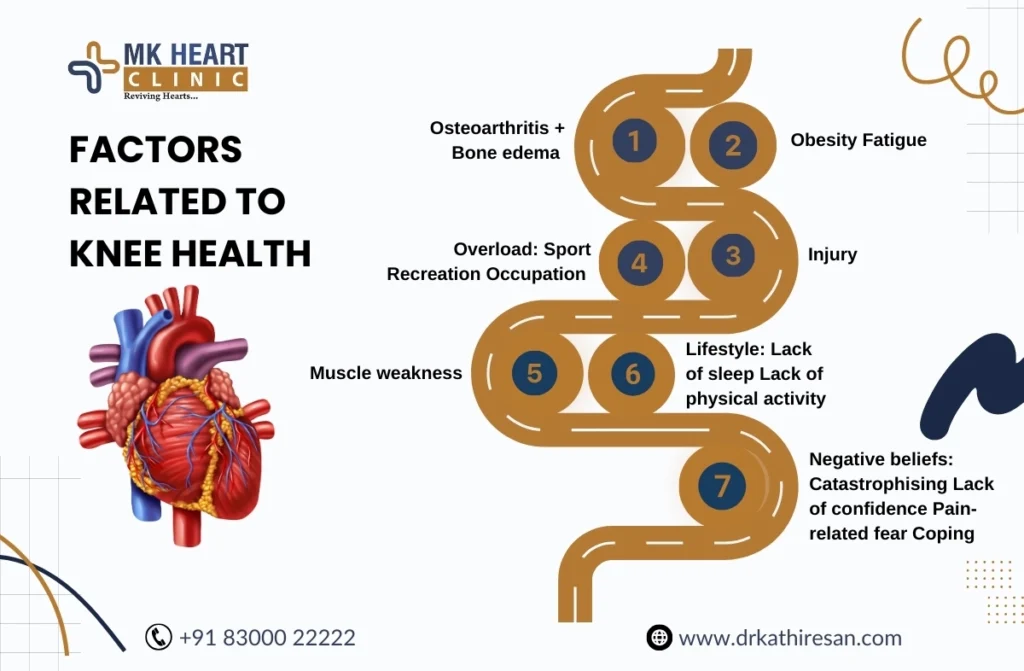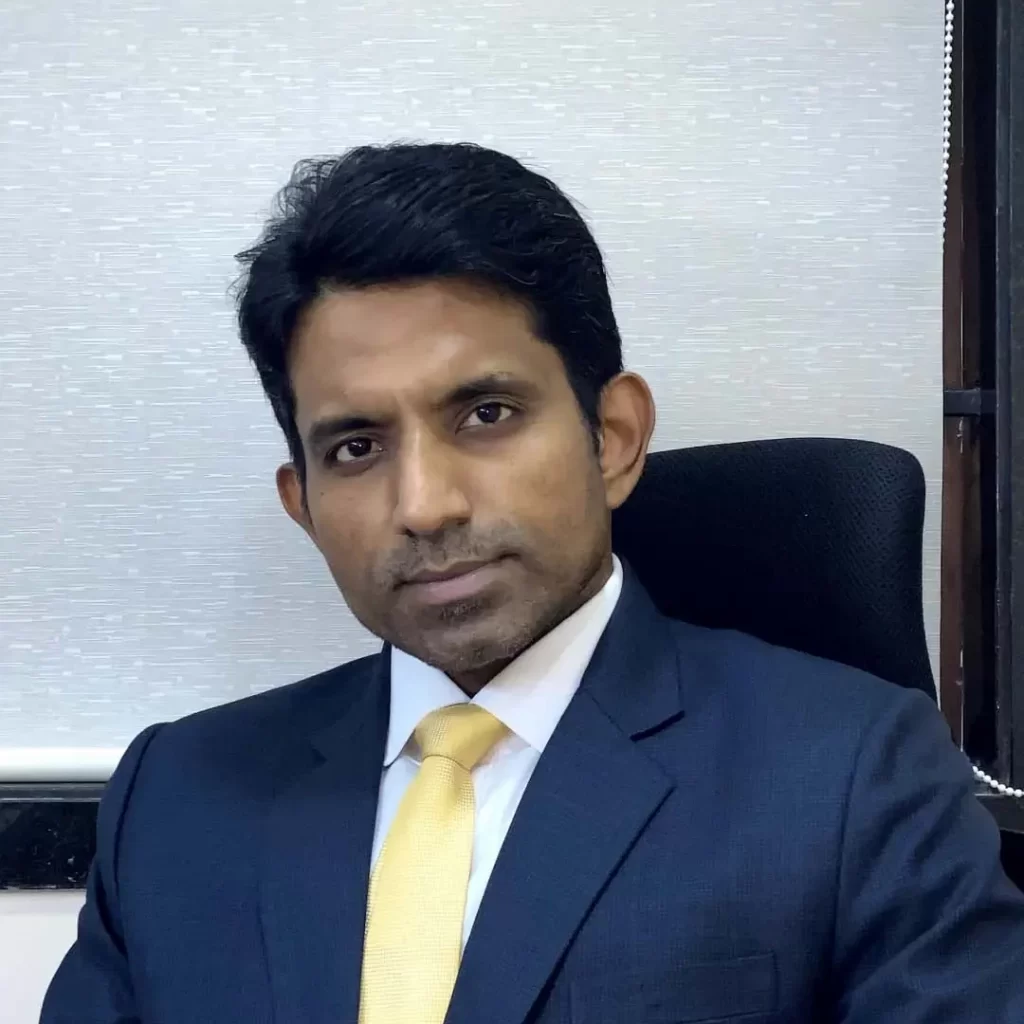If you’re seeking knee pain treatment in Chennai, Bharath Orthopaedics provides a comprehensive solution for various knee conditions, addressing your specific needs. Their services cater to individuals experiencing knee pain, offering effective treatment options.
Knee pain is a common grievance that strikes all people including the (femur, tibia, fibula) knee joint, (patella) the kneecap or the ligaments, tendons, and (meniscus) cartilage of the knee. Common knee problems can arise due to the aging process, physical injuries, or sudden movements like muscle or tendon strains and injuries in the knee, ligament damage, tendonitis, osteoarthritis, and rheumatoid arthritis.
Physical therapy can be beneficial in reducing knee pain and improving mobility through targeted exercises and stretches. Additionally, using knee braces or supports can help provide stability and alleviate discomfort in the knee joint replacement. In some cases, however, your knee may require surgical repair if the pain becomes severe for the knee replacement in Chennai.

Knee Pain Doctors in Chennai
Dr. Bharath Loganathan
MBBS, MS (Ortho), MRCS (Edinburg)
Dr. Bharath Loganathan is one of the leading Knee Pain Doctors in Chennai, specializing in diagnosing and treating knee-related conditions. With years of experience in orthopedic care, he provides personalized treatment plans for patients suffering from knee pain due to arthritis, injuries, and other joint disorders.
- Specializations: Orthopaedics
- Years of Experience: Over 20+ years
- Qualifications: MBBS, MS (Orthopaedics), DNB (Orthopaedics)
- Available Time: Mon-Sat 9 am to 8 pm | Sun – 10 am to 3 pm
- Address: Flat-A Ground Floor , Balaji Villa, New Door No.38/1, Old Door No.9/1, Rajaratnam Street, Kilpauk, Chennai-600010.

Why Choose Dr. Bharath Loganathan?
- Expertise in advanced knee pain treatments.
- Specializes in minimally invasive and surgical procedures.
- Patient-centered approach for better recovery.
Dr. Bharath Loganathan offers comprehensive care, from pain management techniques to surgical interventions. Whether it’s physical therapy, medication, or knee replacement surgery, he ensures patients receive the best treatment. If you’re looking for Knee Pain Doctors in Chennai, Dr. Bharath Loganathan is a trusted name for expert orthopedic care.
Conditions Treated for Knee Pain
Some of the most common conditions that require best knee pain treatment in Chennai include:
- Osteoarthritis: Degenerative joint disease-causing knee pain, inflammation, and stiffness.
- Ligament Injuries: Including anterior cruciate ligament (ACL) tears, leading to knee instability.
- Meniscus Tears: Damage to the cartilage, causing pain and limited mobility.
- Patellofemoral Pain Syndrome: Knee pain around the kneecap, due to misalignment/overuse.
- Bursitis: Inflammation of the fluid-filled sacs around the knee joint causing pain and swelling.
- Tendinitis: Inflammation of the tendons in the knee with pain and restricted movement.
- Cartilage Injuries: Damage to the knee’s protective cartilage, leading to joint dysfunction.
- Patellar Dislocation: Displacement of the kneecap from its normal position.
- Rheumatoid Arthritis: Chronic autoimmune disease affecting the knee joint.
- Gout: Arthritis characterized by the accumulation of uric acid crystals in the knee joint.
- Osgood-Schlatter Disease: A condition commonly seen in young athletes.
- Fractures: Broken bones in the knee joint resulting from trauma or injury.
- Tumors: Both benign and malignant tumors that affect the knee joint, causing pain and functional impairment.
Signs and Symptoms of Knee Pain
The signs of symptoms of knee pain or injury include the following:
- Difficulty in climbing stairs due to ligament damage (sprain).
- Inability to fully straighten the knee.
- Limping due to discomfort.
- Changing weight to the opposite knee and foot.
- Locking (unable to bend the knee).
- Knee instability leads to difficulty in walking.
- Redness and warmth to the touch.
- Swelling and stiffness.
- Popping or crunching noises.
If you are prone to these signs and symptoms, you should consult an orthopaedician to get the best knee pain treatment in Chennai.
Causes of Knee Pain
Understanding the underlying causes of knee pain is the first step towards effective treatment. Common causes include:
- Osteoarthritis: Degenerative joint disease causing cartilage breakdown.
- Rheumatoid Arthritis: An autoimmune condition that inflames the joints.
- Meniscal Injuries: Tears in the knee’s cartilage due to sudden twists or aging.
- Ligament Injuries: Common in athletes, particularly ACL (anterior cruciate ligament) injuries.
- Bursitis: Inflammation of the fluid-filled sacs (bursae) that cushion the knee joint.
- Patellar Tendinitis: Overuse injury affecting the tendons connecting the kneecap to the shinbone.
Diagnosis of Knee Pain
The process of diagnosing knee ailments begins with a comprehensive review of the patient’s medical history, including consideration of family history regarding joint pain, as certain disorders can have a genetic component. This is followed by a physical examination of the affected joint to identify visible signs and evaluate its functionality.
Additionally, diagnostic tests during the best Knee Pain Treatment in Chennai are typically essential as they are employed to determine the underlying cause of the disorder. Some of the diagnostic tests include:
- X-ray: Uses radiation to image bones and identify fractures or joint abnormalities.
- Bone Scan: Detects bone metabolism changes to diagnose bone diseases or tumors.
- CAT Scan: Provides detailed cross-sectional images of bones, joints, and soft tissues.
- MRI: Uses magnetic fields to generate detailed images of knee structures for diagnosing ligament tears and cartilage damage.
- Arthroscopy: Minimally invasive surgery using a camera to visualize and treat knee conditions.
- Biopsy: Collects tissue samples for lab analysis to diagnose inflammatory or neoplastic knee conditions.
Risk Factors
Several factors can increase the risk of developing knee pain, including:
- Age: Risk increases with age due to natural wear and tear.
- Obesity: Extra weight adds stress to the knee joints, accelerating cartilage wear.
- Previous Injuries: Past knee injuries can predispose you to chronic pain.
- Occupational Hazards: Jobs that involve repetitive knee movements can lead to chronic knee pain.
- Lack of Physical Activity: Sedentary lifestyle weakens muscles that support the knee joint.
Complications
Untreated knee pain can lead to various complications, such as:
- Chronic Pain: Persistent knee pain can become a long-term issue.
- Reduced Mobility: Severe pain may limit your ability to walk or perform daily activities.
- Joint Deformities: In advanced cases, untreated knee conditions can lead to deformities.
- Muscle Atrophy: Lack of movement can cause the muscles around the knee to weaken.
Common Knee Problems
Chennai is home to top specialists who treat a range of knee conditions. Common knee problems include:
- Knee Osteoarthritis
- Rheumatoid Arthritis
- ACL Injuries
- Meniscal Tears
- Patellofemoral Pain Syndrome
- Knee Bursitis
Surgical and Non-Surgical Procedures
Effective Knee Pain Treatment in Chennai includes both surgical and non-surgical knee Pain Treatment Chennai options:
Non-Surgical Knee Pain Treatment Chennai:
- Physical Therapy: Customized exercises to strengthen knee muscles and improve flexibility.
- Medications: Anti-inflammatory drugs and pain relievers to reduce discomfort.
- Injections: Corticosteroid or hyaluronic acid injections to reduce pain and improve joint function.
- Bracing: Knee braces to stabilize the joint and alleviate pain.
Surgical Procedures:
- Arthroscopy: Minimally invasive surgery to repair damaged tissues within the knee.
- Partial Knee Replacement: Replaces only the damaged portion of the knee joint.
- Total Knee Replacement: Replaces the entire knee joint with an artificial one, often recommended for severe arthritis cases.
- ACL Reconstruction: Rebuilding the damaged ACL ligament using a graft.
Knee Pain Surgery
Surgical procedures for knee pain depend on the specific condition and severity. Common surgeries include:
- Total Knee Replacement (TKR): Replaces damaged knee joint surfaces with artificial implants to reduce pain and improve function in severe arthritis.
- Partial Knee Replacement: Involves replacing only the affected part of the knee joint, preserving healthy bone and ligaments.
- Knee Arthroscopy: Minimally invasive procedure using a small camera and instruments to diagnose and treat various knee conditions, such as meniscus tears or cartilage damage.
- Ligament Reconstruction: Repairs torn ligaments like the ACL (anterior cruciate ligament) using grafts to restore stability.
- Cartilage Restoration: Techniques like microfracture, autologous chondrocyte implantation (ACI), or osteochondral autograft transfer (OATS) aim to repair or replace damaged cartilage.
- Osteotomy: Corrects alignment issues by cutting and repositioning bones to shift weight away from damaged areas, delaying the need for joint replacement in younger patients.
- Synovectomy: Removes inflamed synovial tissue (lining of the joint) in conditions like rheumatoid arthritis or synovitis.
These surgeries aim to relieve pain, improve knee function, and restore mobility, often complemented by post-operative rehabilitation to achieve optimal outcomes. Choosing the appropriate procedure depends on factors such as the underlying condition, extent of damage, and individual patient needs.
Prevention of Knee Pain
- Maintain a Healthy Weight: Reduce stress on knees by staying within a healthy weight range.
- Exercise Regularly: Strengthen muscles around the knees to provide better support and stability.
- Warm Up Before Activity: Stretch and warm up before exercise to prevent strain on knee joints.
- Use Proper Techniques: Practice correct posture and techniques during physical activities to avoid knee injuries.
- Wear Appropriate Footwear: Use supportive shoes to minimize impact on knee joints during daily activities and exercise.
Cost of Knee Pain Treatment in Chennai
The Cost of Knee Pain Treatment in Chennai varies based on the severity of the condition, the type of treatment required, and the hospital chosen. Non-surgical treatments like medications, physiotherapy, and injections are more affordable, while advanced procedures like arthroscopy and knee replacement surgery cost more.
Factors Affecting Cost:
- Type of treatment (medication, therapy, or surgery).
- Hospital or clinic reputation and facilities.
- Surgeon’s expertise and post-treatment care.
On average, basic treatments cost between ₹5,000 to ₹20,000, while surgical procedures can range from ₹1,50,000 to ₹4,00,000. Consulting experienced Knee Pain Doctors in Chennai can help determine the most cost-effective solution for your condition. Always compare hospitals to find the best Cost of Knee Pain Treatment in Chennai suited to your needs.
Conclusion
For the best knee pain treatment in Chennai, consult experienced knee pain doctors who provide comprehensive, tailored care. Whether you require non-surgical physiotherapy treatment or advanced surgical options, a personalized approach is essential for restoring mobility and improving quality of life. Explore trusted healthcare providers offering Non-Surgical Knee Pain Treatment Chennai, ensuring a holistic treatment plan that fits your specific needs. Seek out orthopedic specialists to receive the best possible care and support throughout your recovery journey.
Read also Knee Replacement Surgeons in Chennai.

